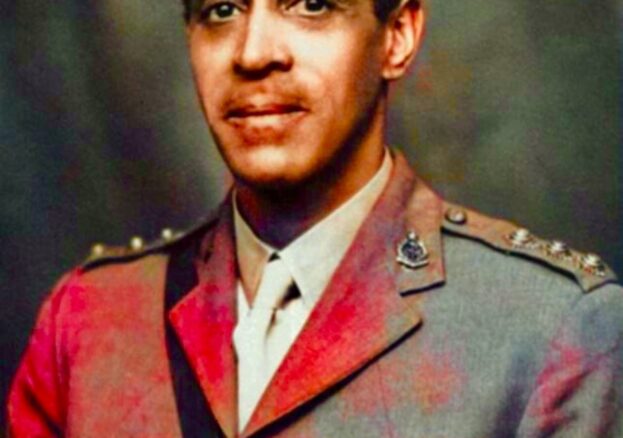
Richard Akinwande Savage (Jnr) was born in Edinburgh in 1903. His father claimed descent from a freed Nigerian slave, and late in the Nineteenth Century travelled to Edinburgh as a Medical Student. Here he met Maggie Bowie, and the couple married in 1899. Richard’s father (also named Richard) was active in student politics and President of the Afro-West Indian Society. After graduation he had a notable career which combined medicine with journalism in West Africa. He was one of the first to call for independence for Nigeria.
Young Richard followed his father’s footsteps by studying medicine at the renowned Medical School at the University of Edinburgh, graduating in 1926 and qualifying the following year.
In September 1940 he received his call up for service in the war, as a 2nd Lieutenant. However, his officer rank was removed, based on his initial commission conflicting with Army regulations requiring officers to be of full British birth. He was demoted to Corporal, but this was later rectified in 1942, and not only was his commission restored, but he was also promoted to Captain, backdated to 1941. He is the first person of West African descent to be commissioned as an officer in the British Army in the Second World War.
He served as a medical doctor in Burma (Myanmar) where he tended to Allied soldiers. His compassion was well regarded, and he insisted on his patients – including African soldiers – being fully recuperated before being sent back to the front lines, a different approach to the usual practice.
Among the soldiers that Richard treated in Burma was Isaac Fadoyebo, a Nigerian soldier, who recorded the quality of care he and fellow West African troops received in his memoirs (‘A Stroke of Unbelievable Luck’).
The crucial contribution of soldiers from West and East Africa during the Second World War, and in Burma in particular, has long been overlooked. At least 90,000 men formed part of the 14th Army – the main British fighting force in the Far East.
Immediately after the war, Richard became the Medical Officer at the Enugu Colliery in Nigeria. He featured prominently in a major incident in Nigerian political history – the Enugu Colliery Massacre of 1949. He gave crucial evidence which disproved the police claim that the miners had provoked the shooting by attacking the police with pickaxes. His evidence was that police injuries came, ironically, from ordnance fragments from their own rifles.
Richard’s first wife was Phyllis Frances Heroina Ribeiro, with whom he had two children, but she passed away in 1940. In 1954, he married Dora Falconer, a fellow British surgeon and officer in the Royal Army Medical Corps. He later retired to Scotland and passed away there in 1993.
Richard’s sister, Agnes, also studied Medicine at Edinburgh University, and later joined her father in West Africa, serving as a junior medical officer in Ghana. Dr Agnes Yewande Savage was another trailblazer in the family: she was the first woman of West African heritage to qualify as a doctor.
With thanks to historian Ed Emeka Keazor whose research has uncovered this important story.
